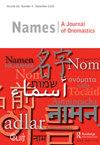英国的姓名传递关系(1838-2014)
IF 0.6
3区 文学
0 LANGUAGE & LINGUISTICS
引用次数: 0
摘要
婴儿的名字经常被用来模拟文化进化的机制,因为它们不是任意给定的,而是基于它们感知到的联想。显示出生登记的数据集会随着时间的推移跟踪这些感知的变化,从而跟踪品味和想法的变化。使用出生登记数据,已经发现了许多传播偏见,这些偏见使人们倾向于偏爱一种文化变体(即一个名字)而不是另一种。虽然许多国家每年发布的出生登记数据促进了这项研究,但这些数据集通常仅限于每年的名字计数。为了深入了解仅从出生登记数据中无法检测到的姓名传播偏见,本研究分析了英格兰的出生、婚姻和死亡登记,生成了一个包含690603个姓名传播关系的数据集,这些关系在1838年至2014年间给出,并将父母和孩子的姓名联系起来。数据揭示了姓氏和父名命名的长期趋势,在整个19世纪,这种曾经很常见的做法每年影响大约15%的男性和8%的女性记录。在第一次世界大战后的整个20世纪,这些做法急剧减少。这些结果强调了在识别命名趋势时,将出生登记数据置于背景中的重要性。本文章由计算机程序翻译,如有差异,请以英文原文为准。
Name Transmission Relationships in England (1838-2014)
Baby names are often used to model the mechanisms of cultural evolution, as they are not given arbitrarily but on the basis of their perceived associations. Datasets showing birth registrations over time track changes in these perceptions, and thereby in tastes and ideas. Using birth registration data, numerous transmission biases have been identified that predispose someone to favour one cultural variant (i.e., a name) over another. While this research is facilitated by the annual release of many countries’ birth registration data, these datasets are typically limited to yearly counts of forenames. To gain insight into name transmission biases not detectable from birth registration data alone, this study parses the birth, marriage, and death registers of England to generate a dataset of 690,603 name transmission relationships, given between 1838 and 2014, and linking the names of both parents and child. The data reveal long-term trends in matro- and patronymic naming, once common practices affecting approximately 15% of male and 8% of female records per year throughout the 19th century. These practices declined precipitously throughout the 20th century, in the aftermath of the First World War. These results highlight the importance of contextualising birth registration data when identifying naming trends.
求助全文
通过发布文献求助,成功后即可免费获取论文全文。
去求助
来源期刊

Names-A Journal of Onomastics
Multiple-
CiteScore
1.30
自引率
50.00%
发文量
23
期刊介绍:
Names, the journal of the American Name Society, is one of the world"s leading journals in the study of onomastics. Since the first issue in 1952, this quarterly journal has published hundreds of articles, reviews, and notes, seeking to find out what really is in a name, and to investigate cultural insights, settlement history, and linguistic characteristics revealed in names. Individuals subscribing to Names automatically become members of the American Name Society and receive the journal as part of their membership.
 求助内容:
求助内容: 应助结果提醒方式:
应助结果提醒方式:


